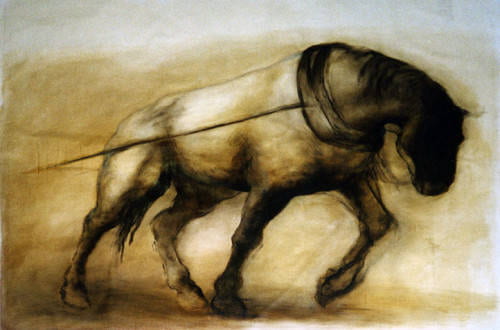
“Working Horse, Hauling,” 1994, by Kate Javens (b. 1959), oil painting on display at The Palmer Museum of Art, Penn State University
I.
He has been erased and redrawn many times, like a recurring nightmare, forced to return with more agonizing detail. Numb, exhausted, with his last breath, he pushes on, the imaginary cargo in tow, with no destination in sight. His greatest enemy shines down on him from above, draining the remaining color from his burdened body, drowning his identity and replacing him with a function.
Whip. Whip. Whip.
His cries are birds. Small, fleeing, nuisances. Insignificant. He is not heard. Paintings do not have mouths with which to speak, they only have hands, to create emotion, empathy, inspiration.
II.
As a child, I was regularly unhappy. Perhaps unhappy isn’t the right word for it, but I was constantly distracted with the future. What are we going to learn in class tomorrow? How did I score on the quiz? What are my parents going to say?
The smell of dirt.
I loved being in the Boy Scouts, but I still couldn’t escape the suffocating feeling of my inexplicable worry. My mother dropped me off by the muddy fire pit. As I laid in my tent, I was overcome with this familiar feeling. It was unfair for a 10 year old, with no worries, job, or responsibilities to feel this way. My friends and I went into the woods to take our minds off of the expectations of school and family. Out on the banks of the Tohickon, Paul, Tommy, and I fished, played frisbee, and talked about things that interest 10 year olds. We enjoyed each other’s company, and my incessant worries were swept down the rapids.
Sunday morning, 8:00 AM.
It’s time to go. It’s almost time for school.
III.
He is unable to turn his head. He does not know what he pulls, only its essence. He knows its size. He knows its scent. He knows its weight.
He was not born for this. He was born to play, to explore, to roam. Instead, he has been harnessed to a contraption he does not want, and forced into a role he does not understand.
He toils further, into the unknown, into the white of the walls, to a destination that does not exist. There will be no carrot waiting at the destination. This moment of pain will last an eternity. His only consolation will be the empathy of onlookers, until he is covered, left in a room to be blinded with dust, and forgotten.